TMJ/Occlusal Disease Management
TMJ Disorder:
TMJ (Temporomandibular Joint Disorder) describes a variety of conditions affecting the temporomandibular joint (the point where the jaw opens and closes) and nerves related to chronic facial pain. These problems are now more easily diagnosed and treated than in the past. Women are twice as likely to be affected as men. In most cases, the symptoms can be treated by Dr. Davis to reduce or eliminate your discomfort. Postponement of treatment usually results in more damage to the joint, muscles, or teeth.
Symptoms of TMJ Disorder
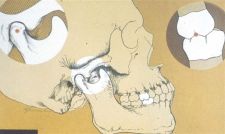
- Jaw pain or soreness, more noticeable in the morning or afternoon
- Jaw pain while chewing, biting, or yawning
- Earache without an infection, sometimes spreading into the face
- Soreness in front of the ear
- A clicking or grinding noise while opening and closing your mouth
- Difficulty opening and closing your mouth
- A stiff jaw when eating, talking, or yawning
- Sensitive teeth without any signs of dental problems
- Aching on the side of the head and neck pain
- A burning sensation in the mouth/tongue
- Grinding of your teeth
- Restricted range of jaw movement or “locking” of the jaw in an open or closed position
Available TMJ Disorder Treatments:
Proper diagnosis is critical to make sure you receive treatment for your particular condition. Dr. Davis will only recommend treatment after conducting a thorough health history, clinical exam, taking appropriate X-rays, and perhaps confirming the condition through other diagnostic tests.
We may prescribe a multiple-phase treatment plan. Only minor corrective treatment may be needed. Treatment may be simple or require more steps for alleviating the condition, depending on the degree of severity.
Some of these treatments include:
- Taking a non-aspirin pain reliever or prescription medications such as muscle relaxants, analgesics, or anti-inflammatory drugs
- Eating soft foods
- Avoiding chewing gum
- Applying moist heat or ice
- Physical therapy
- Teaching relaxation techniques to control muscle tension
- Stress management training techniques
- Posture training
- Wearing bite plates to eliminate the harmful effects of clenching or grinding the teeth, and a better positioning of the jaws
- Adjusting the bite, known as “occlusal equilibration” involving removing interference when the teeth touch
- Replacement of defective restorations that prevent the jaws from meeting properly
- Orthodontics, to put the teeth in proper position
- Surgery
Occlusal Disease
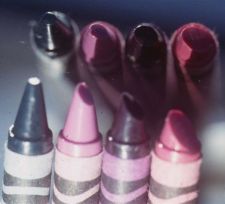
Occlusal Disease – Wear Gets Worse Over Time
What is Occlusal Disease?
Occlusal disease and TMJ disorders are related because they both involve clenching or grinding the teeth. In the case of TMJ disorders, the effects are seen in the jaw joints and muscles, often with associated pain. Occlusal disease occurs when the force of clenching or grinding does damage to the teeth and gums.
The term comes from the word ‘occlusion’ which in dentistry means how the teeth come together when you bite. Repetitive excessive biting forces can, over time, create significant breakdown in your mouth.
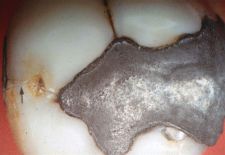
Occlusal Disease – Cracked Teeth
Destructive clenching and grinding can cause any of the following conditions:
- Cracked teeth
- Loose teeth
- Sensitive teeth
- Worn teeth
- Failed fillings
- Gum recession
- Notched tooth roots
- Shifting teeth
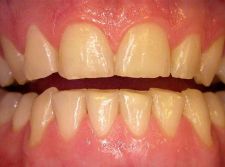
Occlusal Disease – Early Wear
People with uncontrolled clenching for many years usually end up with many cracked teeth and significant gum problems. Those with unmanaged habits of grinding, often at night (sometimes due to being on anti-depressant medications), usually end up with advanced tooth wear. This creates an aged, unattractive smile and compromises chewing ability.
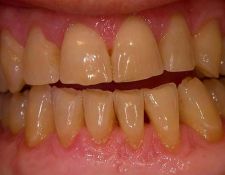
Occlusal Disease – Moderate Wear
In the pictures to the right, you will see how like a child’s crayons, the effects of rubbing teeth together only gets worse over time.
Do you feel you may be noticing signs of occlusal disease in your mouth? For further information or to schedule an exam, call the office of Dr. Davis today. You can also get more information on this topic at www.pankey.org.
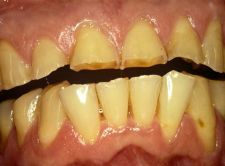
Occlusal Disease – Advanced Wear
What are the treatments for occlusal disease?
Battling occlusal disease is all about force management. For many people, clenching or grinding is such a sub-conscious habit that it can not be stopped entirely. But you can control the effects of it.
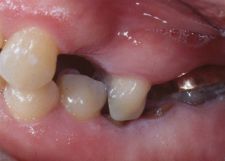
Occlusal Disease – Uneven Bite from Tooth Loss
A bite appliance for night time use virtually eliminates damage to teeth during sleep. Corrections to any misalignment of the teeth will minimize the force on teeth during the day. Teeth that are cracked must be protected with crowns. Teeth that have lost significant amounts of structure can be restored to their original form and appearance. This is usually done with porcelain restorations.

